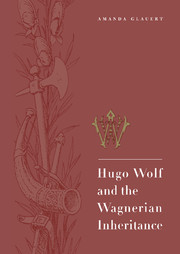Book contents
- Frontmatter
- Contents
- Acknowledgements
- Introduction
- 1 ‘Music of the future’? The nature of the Wagnerian inheritance
- 2 ‘Wagner of the Lied’? Wolf as critic of Wagner and Wagnerism
- 3 Small things can also enchant us – Wolf's challenge to nineteenth-century views of song
- 4 ‘Poetry the man, music the woman’? Wolf's reworking in his Mörike songs of Wagner's aesthetics of words and music
- 5 The integrity of musical language – questions of form and meaning in Wolf's Goethe songs
- 6 The Wolfian perspective – comparisons with the songs of Strauss and Mahler
- Notes
- Bibliography
- Index
5 - The integrity of musical language – questions of form and meaning in Wolf's Goethe songs
Published online by Cambridge University Press: 31 October 2009
- Frontmatter
- Contents
- Acknowledgements
- Introduction
- 1 ‘Music of the future’? The nature of the Wagnerian inheritance
- 2 ‘Wagner of the Lied’? Wolf as critic of Wagner and Wagnerism
- 3 Small things can also enchant us – Wolf's challenge to nineteenth-century views of song
- 4 ‘Poetry the man, music the woman’? Wolf's reworking in his Mörike songs of Wagner's aesthetics of words and music
- 5 The integrity of musical language – questions of form and meaning in Wolf's Goethe songs
- 6 The Wolfian perspective – comparisons with the songs of Strauss and Mahler
- Notes
- Bibliography
- Index
Summary
If one accepts that Wolf found a distinctive voice in his Mörike songs, then one might wonder what further challenges could lie before him in the songbooks that followed. A change of poet – from Mörike to Goethe – would only help prove the effectiveness of his interpretive powers. Some critics, such as Arthur Seidl, noted that Wolf was developing a pronounced taste for early nineteenth-century poetry and neglecting his duty as a modernist to encourage more recent poets. Mörike's poems were little known in the later nineteenth century, so Wolf could claim to be bringing new works to light in his Mörike settings. But Goethe was the most familiar of writers, the father of German Romantic poetry, so that to Seidl Wolf was confirming his conservative colours by allying himself to him. Of course, as we have just seen, Wolf's artistic identity should not be seen as exchangeable with that of the poets he set; the composer could maintain a critical distance from Goethe, just as he did from Mörike. However, Wolf's choice of Goethe did have an impact on how the public saw his role as a song-writer and, as with his later choice of poetry in the Italian songbook, there does seem a sense in which he was concerned to declare more clearly what he was, by his choice of poet.
- Type
- Chapter
- Information
- Hugo Wolf and the Wagnerian Inheritance , pp. 79 - 116Publisher: Cambridge University PressPrint publication year: 1999



